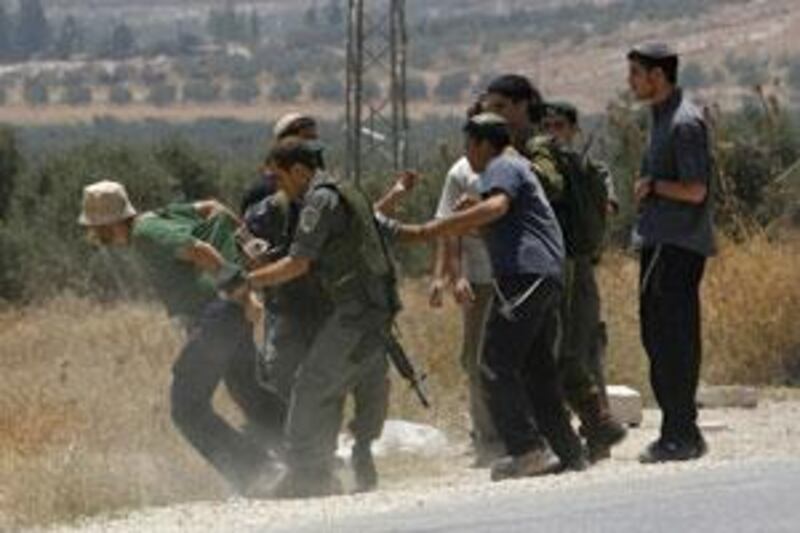RAMALLAH // Walid Assaf was in a hurry on Tuesday. The Palestinian legislator had left Ramallah in the early evening and was late for a meeting in Qalqiliya, the city for which he is a Fatah representative. He never made the meeting, but counts himself lucky that he made it at all. En route, south-west of Nablus and not far from the Yitzhar settlement, home to radical Jewish settlers, a settler in a car driving the opposite direction hurled a large rock at Mr Assaf's car.
The rock hit the car on the metal frame and bounced up and shattered the front window. Mr Assaf was covered in broken shards, but managed to control the car, pull over and compose himself. "I was lucky that the rock first hit the metal," Mr Assaf said yesterday about the incident. "I was driving fast, and it could have been much worse." Violence by Jewish settlers in the occupied West Bank is a common occurrence, and Mr Assaf's experience is a mild example. On June 8, an Israeli court dropped a case against a Hebron-area settler for shooting two Palestinians in late 2008, even though the incident had been filmed by an Israeli human rights group. On June 13, settlers, also from the Hebron area, assaulted and injured an 11-year-old Palestinian boy on his way home from school.
Attacks against Palestinian property are the most common, with settlers often involved in cutting down olive trees or burning orchards belonging to Palestinian farmers. Indeed, in the second week of July, the UN's Office for the Coordination of Humanitarian Affairs (OCHA) counted 10 settler-related incidents, an increase of one-third from the weekly average in the first six months of 2009. With US pressure on Israel to freeze settlement building and dismantle so-called settlement outposts, settlements established without express permission from the Israeli government and therefore ostensibly illegal even under Israeli law - all settlements in occupied territory are illegal under international law - there are fears that settler violence will increase.
The Israeli police are reported to have set up a special unit to deal with preparations for the evacuation of 23 settlement outposts, a measure that has been widely reported in the Israeli media but for which no official announcement has yet been made. In response, Israeli settlers have themselves organised to prevent any such evacuation. An "outpost hotline" has even been established that with rabbinical permission will operate on Saturdays, the Jewish Sabbath, when use of the phone is not normally permitted. The hotline will be used to mobilise settlers to resist any potential evacuations.
Part of the strategy to prevent evacuations is violence against Palestinians and their property, and such overt displays of "incitement" marks a new stage in settler activity, according Dror Etkes, of Yesh Din, an Israeli human rights group. "Before two years, settlers would use violence but not admit so officially. Now official settler policy in the West Bank is to deter the state from any action by using violence, including violence against Palestinians."
Palestinians are an easy target, explained Mr Etkes, because they have no protection. "The system is not focused on protecting Palestinians." In fact, the system is stacked against Palestinians. Jewish settlers and Palestinians live under two different legal systems in the occupied West Bank, part of what Mr Etkes called a "policy of separation". Palestinians answer to military law, while settlers live under Israeli civil law.
It is a situation that B'Tselem, an Israeli human rights group, calls "extremely grave". "Israel is operating a system of separation with discrimination by law. It is doubtful that any comparable system has existed since the end of apartheid in South Africa," reads a statement on the group's website. And the difference is significant. For instance, in the case against Ze'ev Braude, who was filmed by a B'Tselem activist shooting two Palestinians in December, the prosecution eventually had to drop the case because the judge deemed that allowing confidential evidence from the ministry of defence would harm state security.
Yet such secret evidence, to which defence lawyers have no access, is allowed in military courts where Palestinians are tried. "If this case had been heard in a military court, the amount of evidence needed to bring a guilty verdict would have been totally different," Mr Etkes said. "The fact that Palestinians are always indicted in military court and Israelis in civil court makes a huge difference in two ways: the severity of sentencing and the amount of evidence needed to find people guilty."
The separate legal systems also make a difference in terms of law enforcement on the ground. While, according to Mr Etkes, soldiers are tasked with enforcing the law on all residents in the West Bank, in practice the army normally acts only to protect settlers. Law enforcement on settlers is left to the civil police, which only has a limited presence. Mr Assaf found this out for himself when he followed the car, a brown Subaru, from which the rock had been thrown. He flagged down an Israeli army jeep to insist that the two settlers be detained, only to be told to make a complaint to the Israeli police.
"There are two laws for two peoples in the West Bank and the difference between these two laws is the difference between the Earth and the sky," Mr Assaf said. "Israel deals with us as suspects. Settlers have rights." @Email:okarmi@thenational.ae





